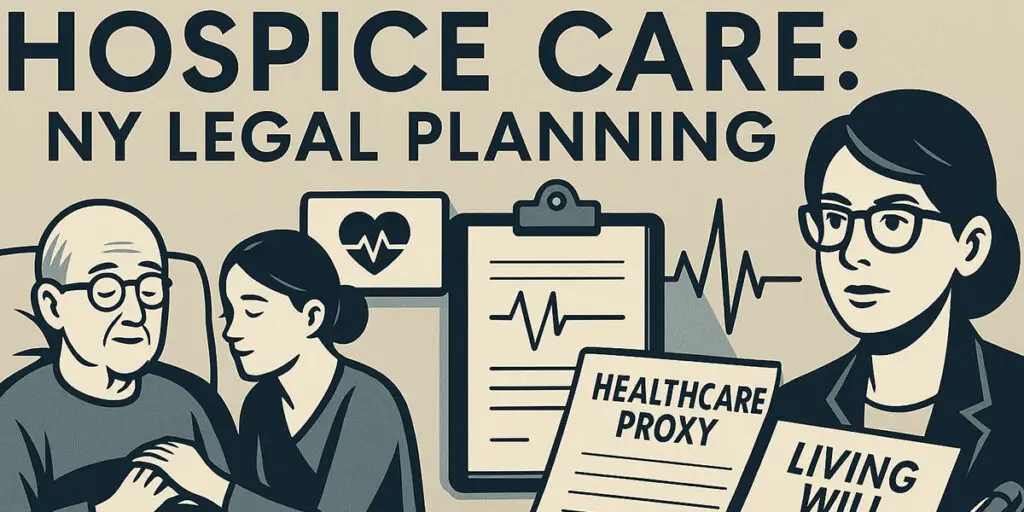Hospice Care and Estate Planning: Why You Need an Attorney in New York
When facing a terminal illness, making the decision to enter hospice care is a significant and often emotional one. During this challenging time, it’s crucial to ensure that your legal and financial affairs are in order, allowing you to focus on comfort, quality of life, and spending precious time with loved ones. An estate planning attorney specializing in elder law can provide invaluable guidance and support during this process, helping you navigate complex legal and financial issues and ensuring your wishes are respected. At Morgan Legal Group, serving New York City and beyond, we understand the sensitive nature of these situations and are dedicated to providing compassionate and comprehensive legal services to individuals and families facing end-of-life decisions. This comprehensive guide explores the intersection of hospice care and estate planning in New York, highlighting the crucial role an attorney plays in providing peace of mind and protecting your interests during this difficult time. Addressing these crucial aspects provides comfort and security.
What is Hospice Care?
Hospice care is a specialized type of medical care that focuses on providing comfort, pain management, and emotional support to individuals with a terminal illness and a prognosis of six months or less to live. The goal of hospice care is to improve the quality of life for patients and their families by addressing their physical, emotional, and spiritual needs. Hospice care is typically provided in the patient’s home, but it can also be provided in hospitals, nursing homes, or dedicated hospice facilities. Hospice emphasizes comfort and dignity in the final stages of life.
Hospice services typically include:
- Medical care and pain management
- Emotional and spiritual support
- Home health aide services
- Medical equipment and supplies
- Respite care for caregivers
- Bereavement support for families
These services are designed to provide holistic support during a difficult time.
The Importance of Estate Planning During Hospice Care
Entering hospice care often signifies a shift in focus towards comfort and quality of life, but it also underscores the importance of having a well-defined estate plan. A comprehensive estate plan ensures that your assets are protected, your wishes are respected, and your loved ones are provided for. It also minimizes the risk of disputes and complications during a time of grief and emotional stress. Without proper planning, your family may face significant legal and financial burdens.
Key aspects of estate planning during hospice care include:
- Reviewing and updating your will or trust
- Ensuring you have a durable power of attorney in place
- Creating or updating a healthcare proxy and living will
- Addressing any potential tax issues
- Planning for the distribution of your assets
Addressing these aspects provides clarity and security for you and your family.
How an Estate Planning Attorney Can Help with Hospice Care Decisions
An estate planning attorney specializing in elder law can provide invaluable assistance during hospice care decisions. The attorney can help you:
- Review and update your existing estate plan
- Create new estate planning documents if needed
- Ensure your healthcare wishes are documented and respected
- Navigate complex legal and financial issues
- Protect your assets and provide for your loved ones
An attorney serves as a trusted advisor and advocate during a challenging time. Their expertise can provide peace of mind and ensure your wishes are honored. It’s also important to have someone unbiased that understands the big picture.
Reviewing and Updating Your Will or Trust
One of the first steps an estate planning attorney will take is to review your existing will or trust. This ensures that your documents are up-to-date and reflect your current wishes. Changes in your family situation, assets, or the law may necessitate revisions to your will or trust. For example, if you have recently married, divorced, or had a child, you will need to update your will or trust to reflect these changes. Similarly, if you have acquired or disposed of significant assets, you will need to adjust your estate plan accordingly. Regular reviews are essential to keep your documents aligned with your wishes and circumstances.
Your attorney will also ensure that your will or trust complies with New York law. This includes ensuring that your will is properly signed and witnessed and that your trust is properly funded. Failure to comply with these requirements can invalidate your will or trust, leading to unintended consequences.
Durable Power of Attorney: Designating Someone to Manage Your Affairs
A durable power of attorney is a legal document that allows you to appoint someone to manage your financial affairs if you become unable to do so. This can be particularly important during hospice care, as you may become unable to manage your finances due to illness or medication. A durable power of attorney remains in effect even if you become incapacitated, providing ongoing protection for your assets. If you do not have a power of attorney, your family may need to go to court to obtain guardianship, which can be a costly and time-consuming process.
When choosing an agent under a power of attorney, it’s important to select someone you trust and who is capable of managing your finances. Your attorney can help you understand the responsibilities of an agent and choose someone who is right for you. An informed decision is essential to protecting your interests.
Healthcare Proxy and Living Will: Expressing Your Healthcare Wishes
A healthcare proxy and living will are essential documents for expressing your healthcare wishes if you become unable to communicate. A healthcare proxy allows you to appoint someone to make medical decisions on your behalf, while a living will allows you to specify the types of medical treatment you want to receive or refuse. During hospice care, it’s particularly important to have these documents in place, as you may face difficult decisions about pain management, life-sustaining treatment, and end-of-life care. These documents ensure your voice is heard, even when you cannot speak for yourself.
Your attorney can help you create or update your healthcare proxy and living will to ensure they accurately reflect your wishes. They can also help you understand the legal implications of your decisions and ensure that your documents comply with New York law. A qualified attorney can provide invaluable guidance in navigating these complex issues.
Addressing Potential Tax Issues
Hospice care and end-of-life planning can raise a number of tax issues. For example, you may need to consider the tax implications of selling assets to pay for medical expenses or the estate tax implications of transferring assets to your heirs. An estate planning attorney can help you navigate these tax issues and minimize your tax liability. They can also work with your accountant or financial advisor to develop a comprehensive tax plan that meets your needs.
Common tax considerations include:
- Capital gains taxes on the sale of assets
- Estate taxes on the transfer of assets to your heirs
- Income taxes on retirement distributions
- Gift taxes on lifetime gifts
Sound tax planning can help preserve more of your wealth for your loved ones.
Planning for the Distribution of Your Assets
One of the primary goals of estate planning is to ensure that your assets are distributed according to your wishes. During hospice care, it’s particularly important to review your beneficiary designations on your retirement accounts, life insurance policies, and other assets. This ensures that your assets will pass to your intended beneficiaries without going through probate. Your attorney can help you review your beneficiary designations and make any necessary changes.
They can also help you develop a plan for distributing your assets in a way that minimizes taxes and protects your beneficiaries’ interests. Careful planning ensures your assets are distributed according to your desires.
Protecting Your Assets from Long-Term Care Costs
Long-term care costs can be a significant concern during hospice care. While hospice care is typically covered by Medicare, Medicaid, and private insurance, there may be other long-term care expenses that are not covered. An estate planning attorney can help you protect your assets from these costs by exploring various planning strategies, such as creating a Medicaid Asset Protection Trust. These strategies can help you qualify for Medicaid benefits while preserving your assets for your loved ones.
However, it’s important to note that Medicaid planning can be complex and requires careful consideration of New York law. Working with an experienced elder law attorney is essential to ensure that your plan is properly structured and complies with all applicable regulations. Expert guidance is crucial in navigating these complex rules.
Navigating Complex Family Dynamics
Hospice care and end-of-life planning can be particularly challenging when dealing with complex family dynamics. Disagreements among family members about medical care, asset distribution, or other issues can create stress and conflict during an already difficult time. An estate planning attorney can help you navigate these issues by facilitating communication, mediating disputes, and ensuring that your wishes are respected. They can also serve as a neutral third party, helping to resolve conflicts and promote harmony among your loved ones.
Addressing potential conflicts proactively can help prevent emotional and legal battles. The team at Morgan Legal Group’s family law department is highly skilled in this practice. Open communication is key to preventing disputes.
The Importance of Clear and Compassionate Communication
Throughout the hospice care and estate planning process, clear and compassionate communication is essential. Your attorney should be able to explain complex legal and financial issues in a way that you and your family can understand. They should also be sensitive to your emotional needs and provide support and guidance during this challenging time. Look for an attorney who is not only knowledgeable but also compassionate and understanding. Your attorney should be a trusted advisor and advocate, providing support and guidance every step of the way.
Open communication helps ensure that your wishes are understood and respected. This also creates an environment of trust and collaboration. Choosing an attorney with strong communication skills is essential for a positive experience.
When to Contact an Estate Planning Attorney During Hospice Care
It’s best to contact an estate planning attorney as soon as possible after making the decision to enter hospice care. This allows you to review and update your estate plan while you are still able to make informed decisions. However, even if you have already entered hospice care, it’s never too late to contact an attorney. They can still provide valuable assistance in ensuring that your wishes are respected and your assets are protected. Prompt action is always recommended to ensure your wishes are honored.
Delaying can lead to complications and limit your options. Don’t hesitate to seek legal guidance during this crucial time.
Finding the Right Estate Planning Attorney for Your Needs
Finding the right estate planning attorney is essential for a smooth and successful experience. Look for an attorney who:
- Specializes in elder law and estate planning
- Has experience working with clients in hospice care
- Is knowledgeable about New York law
- Is compassionate and understanding
- Has strong communication skills
- Is responsive to your needs
Schedule consultations with several attorneys to discuss your specific circumstances and goals. Ask about their fees, experience, and approach to estate planning. Pay attention to how well they communicate and whether you feel comfortable working with them. Trust and rapport are essential in the attorney-client relationship.
Affording Estate Planning Services During Hospice Care
Paying for estate planning services can be a concern during hospice care, particularly if you are facing significant medical expenses. However, it’s important to view estate planning as an investment in your future and your family’s future. There are several ways to make estate planning services more affordable:
- Ask about flat fees or payment plans
- Prioritize essential services
- Utilize online resources
- Seek pro bono or reduced-fee services
Remember that the long-term benefits of estate planning can outweigh the upfront costs. Careful planning can save your family money and stress in the long run. Don’t let financial concerns prevent you from seeking the legal guidance you need. Contacting Morgan Legal Group can help you understand the options available to you.
Working with Morgan Legal Group: Compassionate and Comprehensive Legal Support
At Morgan Legal Group, we understand the unique challenges and sensitivities involved in hospice care and end-of-life planning. Our experienced estate planning attorneys are dedicated to providing compassionate and comprehensive legal support to individuals and families throughout New York City and beyond. We take the time to understand your specific circumstances and goals, and we develop customized estate plans that meet your needs and protect your interests.
We are committed to providing clear and compassionate communication, guiding you through every step of the process. Contact us today to schedule a consultation and learn more about how we can help you navigate hospice care and ensure your wishes are respected. View our Google My Business link.
Morgan Legal Group proudly serves the New York City community including the Bronx, Brooklyn, NYC, Queens, and Staten Island. If you are outside of New York City we also serve Long Island including Suffolk County. As well as Westchester, Ulster County, and Orange County.NY Courts









